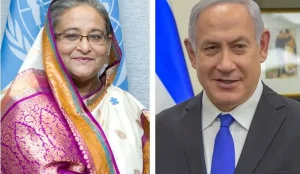New Delhi – In a significant foreign policy shift reflecting strong public sentiment, Bangladesh reinstated the except Israel clause on its passports, effectively prohibiting its citizens from traveling to Israel. This decisive move comes amid escalating tensions in Gaza and follows substantial public demonstrations across Bangladesh’s capital city of Dhaka. The reinstatement represents a notable reversal of a 2021 policy change and signals Bangladesh’s continued diplomatic solidarity with Palestine in the ongoing Middle East conflict.

The directive to reintroduce the statement—”this passport is valid for all countries of the world except Israel”—was issued by the country’s Ministry of Home Affairs on April 7, communicated through Deputy Secretary Nilima Afroze of the ministry’s Security Services Division. This policy of Bangladesh reinstated the except Israel clause reversion carries profound implications for Bangladesh’s international relations, particularly with Israel and other nations involved in Middle Eastern politics, while also addressing domestic political considerations.
As Bangladesh Reinstated the Except Israel Clause, the country aligned itself more firmly with several other nations that maintain similar restrictions regarding travel to Israel. This article explores the context, implications, and reactions to this significant policy change, examining how domestic pressure, international relations, and historical stances on the Palestinian cause converged to influence this diplomatic decision.
Historical Context: Bangladesh’s Stance on Israel
The relationship between Bangladesh and Israel has been complex since Bangladesh’s independence in 1971. Bangladesh, as the world’s fourth-largest Muslim-majority nation, has historically maintained a position of non-recognition of Israel, rooted in solidarity with Palestinian self-determination and statehood aspirations. Before Bangladesh Reinstated the Except Israel Clause in 2024, the country had maintained this restriction for decades, making the 2021 removal particularly controversial.
Bangladesh’s historical position reflects broader trends among many Muslim-majority nations that have maintained diplomatic distance from Israel as a form of protest against Israeli policies toward Palestinians. This stance has been a consistent feature of Bangladesh’s foreign policy, with successive governments maintaining the restriction despite varying domestic political orientations.
When the Awami League government under Sheikh Hasina removed the restriction in 2021, it represented a potential shift in Bangladesh’s long-standing position. Official statements at the time suggested the change was made to modernize Bangladeshi passports and align them with international standards. However, the removal was met with significant criticism from various political and religious groups within Bangladesh who viewed it as a betrayal of the Palestinian cause.
Now that Bangladesh Reinstated the Except Israel Clause, the country has returned to its historical position, reinforcing its diplomatic stance amid heightened tensions in Gaza. This restoration of policy aligns Bangladesh with countries like Malaysia, Pakistan, and several Middle Eastern nations that maintain similar restrictions.
The 2021 Removal: A Controversial Decision
In 2021, the Sheikh Hasina government made the controversial decision to remove the “except Israel” phrase from Bangladeshi passports. This change came as a surprise to many observers both domestically and internationally, as Bangladesh had maintained this restriction since the country’s founding. When officials announced the removal, they framed it as a modernization effort aligned with international passport standards and norms.
The decision sparked immediate backlash from various segments of Bangladeshi society. Conservative religious groups, opposition political parties, and pro-Palestinian activists viewed the removal as a potential shift away from Bangladesh’s traditional support for the Palestinian cause. Some critics alleged the change might be a precursor to normalizing relations with Israel, following the pattern of several Arab states that had recently established diplomatic ties with Israel through the Abraham Accords.
The timing of the removal also raised questions, as it came during a period when several Muslim-majority countries were reconsidering their stance on Israel. However, Bangladesh’s Foreign Ministry had maintained at the time that the passport modification did not represent a change in the country’s position on Israel, stating that Bangladesh still did not recognize Israel as a state.
When Bangladesh Reinstated the Except Israel Clause in April 2024, it effectively nullified this controversial 2021 decision. The reversal came under different political circumstances, with growing public pressure amid the Gaza conflict playing a significant role in the government’s reconsideration of its position.
Catalysts for Change: Gaza Conflict and Public Response
The immediate trigger for the decision that Bangladesh Reinstated the Except Israel Clause appears to be the intensification of the Gaza conflict and the subsequent public response within Bangladesh. Since October 2023, the conflict in Gaza has resulted in thousands of casualties, predominantly Palestinian civilians, triggering worldwide protests and diplomatic tensions.


In Bangladesh, the response to the Gaza situation has been particularly strong, culminating in massive demonstrations across the country. The most notable of these protests occurred at Suhrawardy Udyan near Dhaka University, where an estimated 100,000 people gathered to express solidarity with Palestinians. Protesters waved Palestinian flags, chanted slogans like “Free, Free Palestine,” and displayed effigies of former US President Donald Trump and Israeli Prime Minister Benjamin Netanyahu.
These demonstrations revealed the depth of public sentiment regarding the Palestinian cause in Bangladesh. The protesters represented diverse political affiliations, including the Bangladesh Nationalist Party (BNP) led by former Prime Minister Khaleda Zia, as well as various right-wing Islamic parties and organizations that have traditionally supported Palestinian rights.
The public pressure created by these demonstrations likely played a significant role in the government’s decision. When Bangladesh reinstated the except Israel clause, it was responding not only to immediate public sentiment but also to deeper currents of support for Palestinian self-determination that have long characterized Bangladeshi politics and civil society.
The Official Directive: Implementing the Policy Reversal
The formal process through which Bangladesh reinstated the except Israel clause began with an official directive from the Ministry of Home Affairs on April 7, 2024. The order, issued through Deputy Secretary Nilima Afroze of the ministry’s Security Services Division, mandated the return of the exact phrasing: “this passport is valid for all countries of the world except Israel” on all newly issued Bangladeshi passports.
This directive sets in motion the bureaucratic machinery necessary to implement the change across Bangladesh’s passport issuance system. The Department of Immigration and Passports will now need to update their printing protocols to include this statement on all new passports. Additionally, protocols may need to be established regarding the validity of passports issued during the period when the restriction was not printed (2021-2024).
The implementation of this policy reversal demonstrates how quickly diplomatic stances can shift in response to evolving geopolitical situations and domestic pressures. When Bangladesh reinstated the except Israel clause, it prioritized alignment with public sentiment over the previous government’s modernization justification, suggesting a recalibration of priorities under current political circumstances.
The ministry’s directive did not specify whether existing passports without the Bangladesh reinstated the except Israel clause would need to be reissued or if the restriction would apply only to newly printed documents. This ambiguity creates potential questions regarding enforcement and recognition of the restriction for Bangladeshi citizens traveling with passports issued during the 2021-2024 period.
Political Dimensions: Domestic Considerations
The decision of Bangladesh reinstated the except Israel clause carries significant domestic political implications for Bangladesh. When Bangladesh reinstated the “except Israel” clause, the government was responding to pressure from various political constituencies, particularly those aligned with conservative religious values and pro-Palestinian sentiment.


Support for the Palestinian cause cuts across political lines in Bangladesh, with both major political forces—the Bangladesh Awami League and the Bangladesh Nationalist Party (BNP)—historically expressing solidarity with Palestinians. However, the BNP and its allied religious parties have often positioned themselves as stronger advocates for Muslim causes internationally.
The timing of the reinstatement is particularly noteworthy given Bangladesh’s recent political transitions. After Bangladesh reinstated the except Israel clause, analysts noted that the move could be interpreted as an attempt by the current government to differentiate itself from the previous administration’s policies and to shore up support among religious conservatives and traditionalists who view strong support for Palestine as a fundamental position.
The presence of BNP leadership at the massive Dhaka protests demonstrates how the Palestinian cause has become a rallying point for opposition politics in Bangladesh. By responding to these demonstrations when Bangladesh reinstated the except Israel clause, the government may be attempting to neutralize a potential opposition talking point while aligning policy with broad public sentiment.
Additionally, the reinstatement reflects the complex interplay between Bangladesh’s secular governmental traditions and the religious sentiments of its predominantly Muslim population. Throughout Bangladesh’s history, governments have had to balance these sometimes competing forces, and the passport restriction represents one area where religious sentiment has clearly influenced foreign policy positioning.
International Relations Implications
When Bangladesh reinstated the except Israel clause, the country reinforced its position within a bloc of nations that maintain diplomatic distance from Israel. This positioning has multiple implications for Bangladesh’s international relations, particularly with Israel, Palestinian territories, Western allies, and other Muslim-majority nations.
Most directly, the reinstatement formally reinforces Bangladesh’s non-recognition of Israel and restricts potential direct engagement between the two countries. While Bangladesh and Israel had no formal diplomatic relations even during the period when the passport restriction was lifted, the restoration of the explicit travel ban sends a clear signal about Bangladesh’s stance.
The decision that Bangladesh reinstated the except Israel clause will likely strengthen Bangladesh’s relations with Palestinian authorities and with other nations that maintain strong pro-Palestinian positions. Countries like Malaysia, Pakistan, and several Middle Eastern nations maintain similar passport restrictions and may view Bangladesh’s decision as an affirmation of shared values and diplomatic alignment.
Also Read: President Murmu Slovakia Visit: Remarkable India-Slovakia Business Forum 2025
Conversely, the move might create certain tensions with Western nations that have encouraged greater normalization of relations with Israel, particularly the United States. However, the practical impact on these relationships is likely to be minimal, as Bangladesh’s position on Israel has been consistent historically, and the 2021 removal of the clause never led to actual diplomatic normalization with Israel.
The timing of the decision may also position Bangladesh within the current international discourse on the Gaza conflict. As Bangladesh reinstated the except Israel clause amid heightened global attention to the situation in Gaza, the country aligned itself with the many voices calling for increased pressure on Israel regarding its military operations in Palestinian territories.
Global Context: Bangladesh Among Non-Recognition Countries
When Bangladesh reinstated the except Israel clause, it rejoined a specific group of nations that maintain similar explicit restrictions regarding Israel. This positioning places Bangladesh within a broader global context of countries with varying degrees of non-recognition policies toward Israel.
Currently, approximately 30 countries do not recognize Israel as a sovereign state, with many of these being member states of the Organization of Islamic Cooperation (OIC). Among these, several—including Malaysia, Pakistan, Saudi Arabia (though policies are evolving), and Iran—maintain passport restrictions similar to the one Bangladesh has reinstated.
The global landscape regarding Israel recognition has shifted considerably in recent years, particularly with the Abraham Accords facilitating normalization of relations between Israel and countries like the UAE, Bahrain, Morocco, and Sudan. These developments make Bangladesh’s decision to maintain its traditional stance more notable, as it runs counter to the recent trend of Muslim-majority countries establishing ties with Israel.
When Bangladesh reinstated the except Israel clause, it signaled its alignment with the bloc of nations that continue to condition normalization of relations with Israel on resolution of the Palestinian issue. This positioning reflects Bangladesh’s assessment that its diplomatic, political, and moral interests are best served by maintaining this stance despite evolving regional dynamics.
Media Coverage and Public Discourse
The announcement that Bangladesh reinstated the except Israel clause generated significant media coverage both within Bangladesh and internationally. Domestic media largely framed the decision as a response to public demand and a reaffirmation of Bangladesh’s traditional support for Palestinian causes.
Conservative and religious media outlets in Bangladesh particularly celebrated the decision, portraying it as a correction of what they had viewed as a concerning policy shift in 2021. These perspectives often emphasized the moral and religious dimensions of standing with Palestinians against Israeli military operations in Gaza.
International coverage has varied according to regional perspectives. Media outlets in Muslim-majority countries generally reported the decision positively, while Western media has tended to focus on the decision as a response to the current Gaza conflict and domestic pressure within Bangladesh.
Social media platforms revealed diverse public reactions to the news that Bangladesh reinstated the except Israel clause. While supporters praised the move as an appropriate stance of solidarity, some critics—particularly those focused on international relations and diplomatic modernization—questioned whether such restrictions remain practical or beneficial in the contemporary global context.
The public discourse surrounding this decision reveals the complex interplay of national identity, religious values, international relations, and pragmatic considerations that shape Bangladesh’s approach to the Israeli-Palestinian conflict.
Historical Parallels: Previous Policy Fluctuations
While the removal and subsequent reinstatement of the passport restriction has attracted significant attention, Bangladesh reinstated the except Israel clause in a manner that reflects previous patterns of policy adjustment in response to public sentiment regarding the Palestinian cause.
Throughout Bangladesh’s history, governments have occasionally faced pressure to strengthen or reaffirm their stance on Israel and Palestine, typically during periods of heightened conflict in the Middle East. These pressures have led to various diplomatic statements, policy adjustments, and symbolic gestures over the decades.
The 2021 removal of the clause represented an unusual departure from Bangladesh’s historical position, making the fact that Bangladesh reinstated the except Israel clause a return to the diplomatic status quo rather than an entirely new position. This historical context helps explain why the reinstatement received such strong public support—it aligned with what many Bangladeshis viewed as the country’s proper stance.
Previous governments in Bangladesh have similarly had to navigate the delicate balance between modernizing international relations and maintaining positions on issues like Palestine that resonate deeply with the Bangladeshi public. The current situation demonstrates the continuing relevance of these historical patterns in shaping contemporary foreign policy decisions.
Looking Forward: Diplomatic Trajectories
Now that Bangladesh reinstated the except Israel clause, questions arise about future diplomatic trajectories for Bangladesh regarding Israel and the broader Middle East. The reinstatement suggests that any potential normalization of relations with Israel remains distant, contingent on significant developments in the Israeli-Palestinian conflict.
This position aligns Bangladesh with countries that maintain that normalization should follow, rather than precede, meaningful progress toward Palestinian statehood and resolution of core issues like borders, settlements, and Jerusalem’s status. While some Arab states have reversed this traditional sequencing through the Abraham Accords, Bangladesh’s reinstatement indicates commitment to the traditional approach.
In the near term, the fact that Bangladesh reinstated the except Israel clause is likely to reinforce Bangladesh’s diplomatic relationships with Palestinian authorities and with other states that maintain strong pro-Palestinian positions. It may also create opportunities for Bangladesh to play a more vocal role in international forums regarding the Israeli-Palestinian conflict.
However, the decision does not completely foreclose future evolution in Bangladesh’s stance. International relations remain dynamic, and significant changes in the Israeli-Palestinian situation could potentially create conditions where Bangladesh might reconsider aspects of its position, even while maintaining core principles regarding Palestinian rights.
For now, the decision that Bangladesh reinstated the “except Israel” clause indicates policy stability on this issue for the foreseeable future, establishing clear parameters for Bangladesh’s diplomatic engagement regarding Israel and Palestine.
Final Word: Balancing Principle and Pragmatism
The decision that Bangladesh reinstated the except Israel clause represents a complex balancing of diplomatic principles, domestic political considerations, religious and cultural values, and pragmatic international relations. This policy reversal illustrates how nations navigate competing pressures in formulating foreign policy positions, particularly on issues with significant religious and emotional resonance.
For Bangladesh, the passport restriction serves multiple purposes: it symbolically reinforces solidarity with Palestinians; it responds to strong domestic sentiment across political divides; it maintains consistency with historical diplomatic positions; and it aligns Bangladesh with other nations that condition normalization with Israel on resolution of the Palestinian issue.
As the situation in Gaza continues to evolve and generate international responses, the fact that Bangladesh reinstated the except Israel clause positions the country within a specific diplomatic framework regarding the conflict. This positioning reflects Bangladesh’s assessment of its values and interests as a Muslim-majority democracy with strong ties to both Western nations and the Islamic world.
Whether viewed as primarily symbolic or substantively impactful, the passport restriction represents Bangladesh’s contribution to the ongoing global conversation about the Israeli-Palestinian conflict and appropriate international responses to it. The decision that Bangladesh reinstated the except Israel clause will likely remain a defining feature of Bangladesh’s foreign policy stance until significant developments in the Middle East create conditions for potential reconsideration.
In the meantime, the restriction serves as a visible reminder of Bangladesh’s continued solidarity with Palestinian aspirations for statehood and self-determination, a position that transcends domestic political divisions and resonates deeply with the country’s sense of identity and justice in international affairs.

